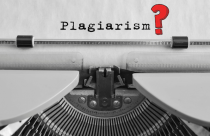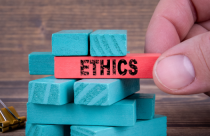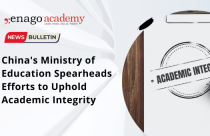How to Tackle Research Misconduct?

Research misconduct describes a wide variety of immoral behaviors, including corrupt or unethical research methods, denying or claiming unfair authorship, plagiarism, data falsification and fabrication, and fraud. This article features a conversation between researchers who discuss what misconduct looks like and what to do about it. The participants in the discussion are the narrator, Dr. Anja Mielke, who supervises a linguistics lab, along with Professor Xuewen Wu (a chemist), Dr. Rainier Jordan (an environmental researcher), Professor Saehee Kim (an education researcher), and Professor Juan Luis Gabriel (an anthropologist). The conversation takes place during a conference on research misconduct.
Is that Research Misconduct?
It was my second day at the conference, which I hadn’t planned on attending. Nevertheless, my department sent me at the last minute after a senior colleague of mine caught a nasty case of the flu. Frankly, I found his sudden flu suspicious- everyone in the department knew the rumors about his research misconduct.
I spotted Professor Kim, a friend of mine, sitting with a group in the lounge. I went over to say hello.
“Professor Kim!” I said.
Professor Kim stood up and clasped my hands in greeting. “Dr. Mielke, it’s a pleasure as always. Please join us.”
“Thank you,” I said, as introductions were made and hands were shaken. “Are all of you enjoying the conference?”
“ I am enjoying it very much so far,” said Professor Gabriel. “Nevertheless, some of the scenarios they are describing seem wild to me. I cannot imagine that this kind of conduct is taking place in institutions. Fraud? Data falsification? Plagiarism? It’s terrible.”
“Right?” said Dr. Jordan. “I know it was a terrible problem in the 1980s when there were those reports of misconduct by the media. But I thought the policies put in place since then had improved things.”
“I thought so, too, with new rules put in place on how to handle accusations and conduct investigations. But let me tell you about a case,” I said. “Recently, in our department, a very respected PhD student quit mid-way through the semester. I, like most of the staff. She was well into her dissertation and had a promising career ahead. However, after she left, rumors began to circulate that her advisor was the reason she quit.”
“Oh?” said Professor Wu. “What happened?”
I sighed. “Supposedly, he was taking credit for her research by publishing it under his name. She had tried to go to the department head to switch advisors, but they told her it was too late to change. When she explained what was happening, her concerns were dismissed. Why would a tenured professor need to steal the work of a mere student? She was afraid that her professor would ruin her career if she denounced him, so instead, she quit.”
The Hurdle of Accountability
Dr. Wu spoke up. “I can completely understand this. When I was doing my doctoral degree, few professors were well-known for this kind of unethical behavior, and all of us tried to avoid becoming their RAs because of it. But their papers were published in major journals, bringing fame to the school and department, so the administration didn’t want to take action against them. However, the irony was the more they did this, the better their careers got.”
Dr. Kim shook her head. “The school is always afraid of a scandal, so they try to deny or shift responsibility for what is happening. The whistleblowers look like the troublemakers and suffer consequences far more often than the perpetrators. At my previous university, a professor was falsifying the data. The students in his lab tried to blow the whistle, but he failed them in his class in retaliation. The university covered it up. Most of them left or changed majors at great cost to themselves.”
Dr. Gabriel asked, “So what should someone do in this situation then? Surely if they made the conduct of the university public, then the university would be the one in trouble?”
Dr. Jordan agreed. “Yes, this happened to a friend of mine. One of her colleagues was caught falsifying data after the paper had been published. However, the university acknowledged the problem because they had to, and fired the researcher who was caught. In the end, everyone applauded them for not tolerating misconduct, and their reputation improved.”
I rolled my eyes. “If they had just reported it in the first place, they would have looked much better. We’re all human, and everyone makes mistakes- when institutions try to pretend this isn’t true, they end up harming people.”
How to Prevent Research Misconduct
Professor Kim, “What is tragic about the scenario is that the student spent so much time and effort and now all of that has been a waste. So, how can we make our institutions better to promote transparency and encourage whistleblowing?”
Professor Wu replied, “Did you sit in on the session by C.K. Gunsalus? She had some t fascinating ideas about this.”
“No!” said Dr. Jordan. “What did she say?”
“Well,” said Professor Wu, “She suggested that investigations on research misconduct should be transparent, with investigation reports made public by institutions. She also said we should have peer review for investigations. Additionally, Universities can form consortia and review investigations.”
“That is a fascinating idea,” I said. “It would resolve so many of these problems.”
Dr. Gabriel added, “Even if you don’t know how the institution will react, it’s important to try to bring these issues to light. Misconduct harms not only institutions but researchers and science itself. We all fear allegations of research misconduct will contribute to public mistrust in science. But if we can show we are a community willing to hold ourselves accountable, we can counteract that narrative by highlighting misconduct and making problems public.”
“Well, this is a great discussion,” “But I must be going. Enjoy the rest of the conference!”
Have you ever encountered research misconduct? What are your institutional policies to handle it? How can we protect the whistleblowers? Let us know your thoughts in the comments below.









